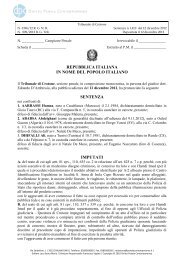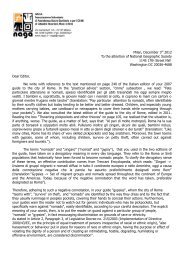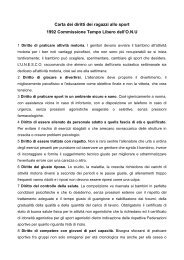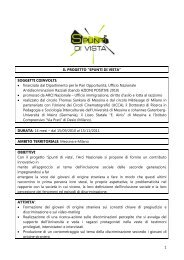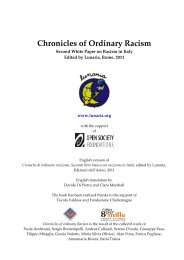Chronicles of ordinary racism 2011 - Cronache di ordinario razzismo
Chronicles of ordinary racism 2011 - Cronache di ordinario razzismo
Chronicles of ordinary racism 2011 - Cronache di ordinario razzismo
- No tags were found...
Create successful ePaper yourself
Turn your PDF publications into a flip-book with our unique Google optimized e-Paper software.
obstacle to the basic rights <strong>of</strong> citizenship, we will try to evaluate whether the tests<br />
provided by the centers in charge are able to convincingly assess the linguistic,<br />
communicative and social skills <strong>of</strong> in<strong>di</strong>viduals to whom no opportunity for training is<br />
<strong>of</strong>fered by the decree.<br />
Tests, drafted accor<strong>di</strong>ng to the instructions provided by the Handbook, as experience and<br />
common sense <strong>di</strong>ctate, assess not so much those tested, but rather the testers<br />
themselves. And they speak volumes about the roles <strong>of</strong> the Interior and Education<br />
Ministries.<br />
The task <strong>of</strong> “certifying” people’s abilities is skillfully side‐stepped: the term<br />
“certification” is never used in the decree, which at art. 5 par. 1, merely mentions<br />
“assessment <strong>of</strong> the degree <strong>of</strong> knowledge <strong>of</strong> the Italian language, through the verifying<br />
<strong>of</strong> the positive outcome <strong>of</strong> the test as registered on electronic resources”; 145 indeed, as<br />
we find written on the Ministry website 146 , “Prefectures send the test results to the<br />
police headquarters” and they are typed into a data bank, “which can be consulted<br />
online by the foreigner”. 147 No written certification, to be handed over to the people<br />
involved, is provided. Certification would involve two responsibilities that the Ministry<br />
is not keen to take upon itself:<br />
1. In Italy there are four recognized boards 148 for the certification <strong>of</strong> linguistic skill<br />
in Italian as foreign language”; 149 to assess ability would be more timeconsuming<br />
for the Ministry than deman<strong>di</strong>ng (without any significant effort) a<br />
document from the aforementioned authorities.<br />
2. The Syllabus lists the obligatory requirements for a “good” test (p. 30):<br />
(a) Reliability, that is the stability and consistency <strong>of</strong> the scoring at <strong>di</strong>fferent<br />
times and under <strong>di</strong>fferent administrators;<br />
(b) Vali<strong>di</strong>ty, that is the abiilty to carefully assess what we meant to assess;<br />
The minister is certainly not able, through the Prefectures, at no cost, to ensure the<br />
slightest reliability and vali<strong>di</strong>ty to the tests set; therefore they cannot give any in<strong>di</strong>cation<br />
about the Italian language skills <strong>of</strong> those who are forced to sit them. In fact the test<br />
145 Please note the extremely involuted ministerial prose.<br />
146 Interior Ministry, Italian language test: procedures and subjects (Il test <strong>di</strong> lingua italiana: il proce<strong>di</strong>mento e i<br />
soggetti<br />
coinvolti,)http://www.interno.it/mininterno/export/sites/default/it/assets/files/20/0827_Il_test_<strong>di</strong>_lingua_italiana_il_<br />
proce<strong>di</strong>mento_e_i_soggetti_coinvolti.ppt<br />
147 Please note the slip in the sentence: the result can be consulted by the foreigner (and not by others): in this case<br />
the “agent” is completely unnecessary (see M. T. Guasti, Italian syntax - Aspetti della sintassi dell’italiano, in L.<br />
Haegeman, Handbook <strong>of</strong> Generative Grammar - Manuale <strong>di</strong> Grammatica Generativa, Hoepli 1996, pp. 589-639, p.<br />
628) as it is evident and obvious (see. F. Sabatini, C. Camodeca, C. De Santis, System and text. From valencegrammar<br />
to text experience - Sistema e testo. Dalla grammatica valenziale all’esperienza dei testi, Loescher <strong>2011</strong>,<br />
p. 238). Therefore, we can surmise that it is mentioned with the specific aim <strong>of</strong> drawing attention to it. The word<br />
“foreigner” appears several times in the ministerial powerpoint, using a language that is rather unusual in<br />
bureaucratic communication ( “the foreigner has access to … the foreigner includes … the foreigner sends<br />
electronically … the foreigner goes, etc.): standard ministerial language uses passive or impersonal forms, without<br />
mentioning the “agent”. The obsessive repetition <strong>of</strong> the agent foreigner can, therefore, only be interpreted as a way<br />
<strong>of</strong> stressing the <strong>di</strong>vide between “us” and “them”..<br />
148 Certification boards for Italian language as L2, Syllabus for Italian L2: level A2 (Sillabo <strong>di</strong> riferimento per i<br />
livelli <strong>di</strong> competenza in italiano L2: livello A2),<br />
http://www.edavarese.it/test_italiano_L2/sillabo_4_enti_certificatori.pdf<br />
149 M. Barni, Italian L2 certificates (Le certificazioni <strong>di</strong> italiano L2), in P. Diadori (e<strong>di</strong>ted by), Teaching Italian to<br />
foreigners (Insegnare l’italiano a stranieri), Le Monnier <strong>2011</strong><br />
56




